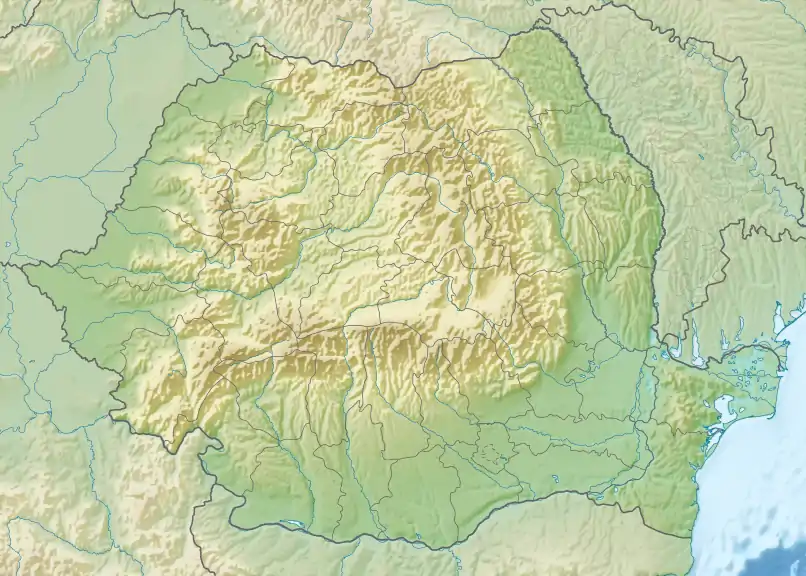Supercupa României
The Supercupa României (English: Romanian Supercup) is a Romanian football championship contested by the winners of the Liga I and the Cupa României. It is usually played at the Arena Națională in Bucharest.
 | |
| Organising body | Romanian Football Federation |
|---|---|
| Founded | 1994 |
| Region | Romania |
| Number of teams | 2 |
| Current champions | Sepsi OSK (2nd title) |
| Most successful club(s) | CSA Steaua (4 titles) |
The competition started off in 1994, with the first edition being won by Steaua București. In 2010, for the first time in its history, the Supercup was held even though CFR Cluj had been victorious in both the league and the cup in the previous season. At that time, they faced Unirea Urziceni, the Liga I runners-up.[1]
The most successful performer so far has been FCSB with 6 wins,[note 1] followed by Rapid București and CFR Cluj with 4 wins each up until 2021.
Sponsorship
On 22 July 2005, FRF and Samsung Electronics signed a one-year sponsorship deal. The name of the competition was changed to Supercupa României Samsung for the 2005 and 2006 editions.[2]
On 9 October 2006, FRF and Ursus Breweries (part of the SABMiller group) signed a sponsorship agreement for the next three seasons. Ursus Breweries changed the name of the competition to Supercupa României Timișoreana, after the Timișoreana beer brand.[3][4]
Results of the finals
| * | Match went to extra time |
| † | Match decided by a penalty shootout after extra time |
| ‡ | Team won the Double |
| 1 / 2 | Liga I Runners-up |
| Italics | Event not held |
1 Because CFR Cluj won the double, Unirea Urziceni, the team that was the runner-up of the previous Liga I season, was chosen to play in the Romanian Supercup as their opponent. This rule was adopted in 2009.
2 Because FCSB won the double, ASA Târgu Mureș, the team that was the runner-up of the previous Liga I season, was chosen to play in the Romanian Supercup as their opponent. This rule was adopted in 2009.
Performances
Performance by qualification
| Competition | Winners | Runners-up |
|---|---|---|
| Liga I winners | 13 | 12 |
| Cupa României winners | 11 | 12 |
| Liga I runners-up | 1 | 1 |
Performance by club
| Team | Champion | Runner-up | Winning Years | Runner-up Years |
|---|---|---|---|---|
| FCSB | 6 | 6 | 1994, 1995, 1998, 2001, 2006, 2013 | 1999, 2005, 2011, 2014, 2015, 2020 |
| CFR Cluj | 4 | 5 | 2009, 2010, 2018, 2020 | 2012, 2016, 2019, 2021, 2022 |
| Rapid București | 4 | 2 | 1999, 2002, 2003, 2007 | 1998, 2006 |
| Dinamo București | 2 | 4 | 2005, 2012 | 2001, 2002, 2003, 2007 |
| Astra Giurgiu | 2 | – | 2014, 2016 | – |
| Sepsi OSK | 2 | – | 2022, 2023 | – |
| Viitorul Constanța | 1 | 1 | 2019 | 2017 |
| Universitatea Craiova | 1 | 1 | 2021 | 2018 |
| ASA Târgu Mureș | 1 | – | 2015 | – |
| Oţelul Galați | 1 | – | 2011 | – |
| Voluntari | 1 | – | 2017 | – |
| Petrolul Ploiești | – | 2 | – | 1995, 2013 |
| Unirea Urziceni | – | 2 | – | 2009, 2010 |
| Farul Constanța | – | 1 | – | 2023 |
| Gloria Bistrița | – | 1 | – | 1994 |
Performance by city
| City | Cups | Winning clubs |
|---|---|---|
| 12 | FCSB (6), Rapid București (4), Dinamo București (2) | |
| 4 | CFR Cluj (4) | |
| 2 | Astra Giurgiu (2) | |
| 2 | Sepsi OSK Sfântu Gheorghe (2) | |
| 1 | Viitorul Constanța (1) | |
| 1 | ASA Târgu Mureș (1) | |
| 1 | Oțelul Galați (1) | |
| 1 | Universitatea Craiova (1) |
Notes
- UEFA and LPF attribute the historic Steaua București records and honours up to 2003 to FCSB. The CSA Steaua București sports club, which refounded their football department in 2017, also asserts the ownership of the four Supercupa României trophies won during that period—This would leave FCSB with only two titles.
References
- "2010 rules change for Supercupa României". Sport.ro (in Romanian). 2010-06-21. Retrieved 2010-06-24.
- "Cupa şi Supercupa României – Samsung". Gazeta de Nord-Vest (in Romanian). 2005-07-23. Archived from the original on May 14, 2008. Retrieved 2008-04-04.
- "Cum au ajuns Bergenbier, Timisoreana si Burger titulari pe terenul de fotbal". Ziarul Financiar (in Romanian). 2007-07-04. Archived from the original on 2008-05-11. Retrieved 2008-03-10.
- "Parteneriat FRF-Timişoreana". FRF (in Romanian). 2006-10-06. Archived from the original on 2008-05-16. Retrieved 2008-04-04.
External links
- Romania - List of Super Cup Finals, RSSSF.com
